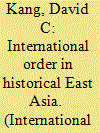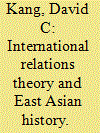| Srl | Item |
| 1 |
ID:
177065


|
|
|
|
|
| Summary/Abstract |
Is unipolarity durable? IR scholars have offered contradictory answers, with primacists arguing for the longevity of US unipolarity and declinists suggesting the opposite. The literature suffers, however, from two shortcomings: (1) theories of unipolarity built on the sole case of the United States are difficult to generalize; and (2) they tend to focus on the defensive measures available to lesser states while downplaying the proactive means the unipole can adopt to prolong its dominance. To remedy these weaknesses, I propose a model of strategic interaction and apply it to two cases of unipolarity in East Asian history, Ming China (1368–1644) and Qing China (1644–1912). I argue that unipolar durability is an outcome of strategic interactions between the unipole’s proactive measures to sustain its asymmetric power advantage and the potential challenger’s ability to increase its power without drawing the unipole’s military containment. Unipolar durability is contingent, not preordained.
|
|
|
|
|
|
|
|
|
|
|
|
|
|
|
|
| 2 |
ID:
171166


|
|
|
|
|
| Summary/Abstract |
IR theorizing about international order has been profoundly, perhaps exclusively, shaped by the Western experiences of the Westphalian order and often assumes that the Western experience can be generalized to all orders. Recent scholarship on historical East Asian orders challenges these notions. The fundamental organizing principle in historical East Asia was hierarchy, not sovereign equality. The region was characterized by hegemony, not balance of power. This emerging research program has direct implications for enduring questions about the relative importance of cultural and material factors in both international orders and their influence on behavior—for describing and explaining patterns of war and peace across time and space, for understanding East Asia as a region made up of more than just China, and for more usefully comparing East Asia, Europe, and other regions of the world.
|
|
|
|
|
|
|
|
|
|
|
|
|
|
|
|
| 3 |
ID:
121726


|
|
|
|
|
| Publication |
2013.
|
| Summary/Abstract |
Long understudied by mainstream international relations (IR) scholars, the East Asian historical experience provides an enormous wealth of patterns and findings, which promise to enrich our IR theoretical literature largely derived from and knowledgeable about the Western experience. The intellectual contributions of this emerging scholarship have the potential to influence some of the most central questions in international relations: the nature of the state, the formation of state preferences, and the interplay between material and ideational factors. Researching historical East Asia provides an opportunity to seek out genuine comparisons of international systems and their foundational components. This introduction surveys the field and sets out to frame debate and the intellectual terms of inquiry to assess progress and guide future research. Theoretically, the essays in this issue provide insights on the emerging literature on hierarchy in international relations, and move beyond simplistic assertions that power "matters" to explore the interplay of material and ideational causal factors. Methodologically, scholars are no longer treating all East Asian history as simply one case, while also becoming more careful to avoid selection bias by avoiding choosing selective evidence from the rich historical record. Collectively, the empirical cases discussed in this volume span centuries of history, include a wide variety of political actors across East Asia, and represent an exciting wave of new scholarship.
|
|
|
|
|
|
|
|
|
|
|
|
|
|
|
|